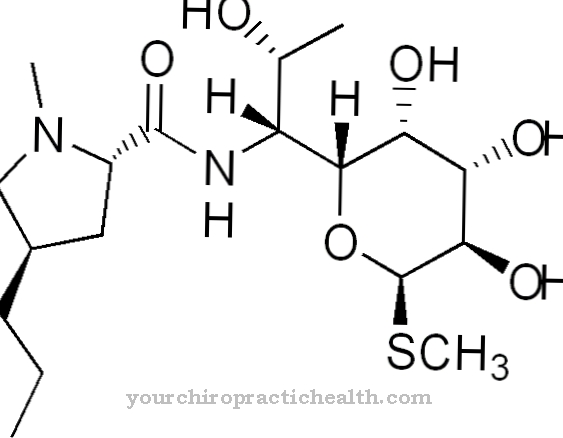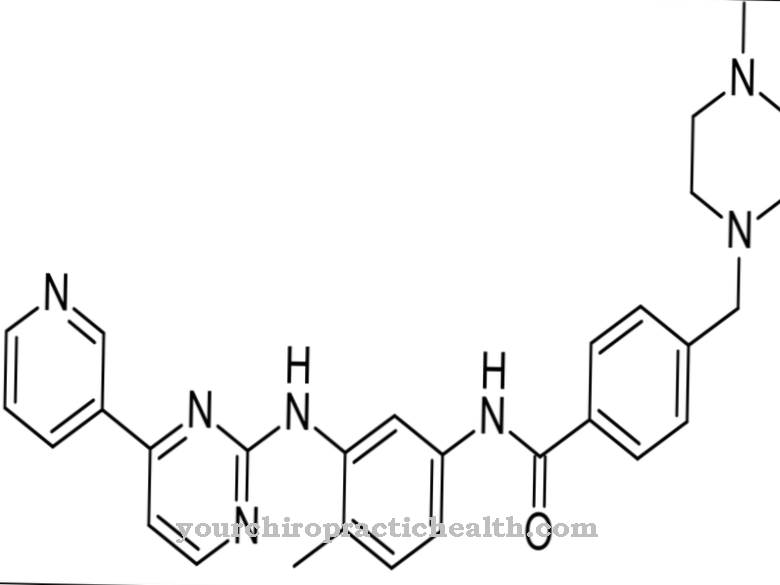Sibutramine is an amphetamine derivative and, in its capacity as an indirect stimulator of the sympathetic nervous system, serves as an appetite suppressant. The active ingredient belongs to the group of serotonin-norepinephrine reuptake inhibitors and is therefore close to various antidepressants and the ADHD drug methylphenidate in its mode of action. Medicines containing sibutramine were withdrawn from the market in European countries in 2010 on the recommendation of the European Medicines Agency due to significant side effects.
What is Sibutramine?

The drug sibutramine, an amphetamine derivative that belongs to the active ingredient group of appetite suppressants (anorectics), was used for the treatment of severe overweight (obesity) until its approval was lost in 2010. The appetite suppressing property of sibutramine is mainly due to its effect as a serotonin-norepinephrine reuptake inhibitor (SNRI). This leads to an increase in the concentration of the neurotransmitter serotonin and the stress hormone adrenaline in the extracellular space and in the synaptic cleft of the nerves involved, which is equivalent to an indirect stimulation of the sympathetic nervous system.
In the event of danger or any other stressor, the sympathetic nervous system normally ensures that stress hormones are released and the body's metabolism is adjusted to call for short-term mental and physical maximum performance for flight or attack. In the course of the short-term metabolic changes, there is also an appetite suppression.
Due to a large number of harmful side effects, some of which were life-threatening, the European Medicines Agency recommended in January 2010 that medicines containing sibutramine should no longer be approved for treatment. The industrialized nations have now followed this recommendation and withdrew their approval for drugs containing sibutramine such as Reductil®, Meridia® and LiDa®.
Pharmacological effect
The multitude of effects that sibutramine has on various tissues, organs and the CNS in addition to appetite inhibition can be largely explained by its indirect stimulation of the adrenergic receptors (adrenoceptors).
As a result of the inhibition of the reuptake of the neurotransmitters serotonin and noradrenaline, the increased extracellular concentration of the messenger substances leads to a correspondingly increased occupation and stimulation of the receptors. The adrenoceptors stimulated in this way trigger metabolic processes that are similar to those of a "real" sympathetic excitation. This means that all tissues and organs that are innervated by sympathetic nerves and present adrenoceptors are affected. This also applies to the CNS and to blood platelets, which also have adrenoceptors on their surface.
The effects on the psyche can usually be described as euphoric and are similar to those of certain psychotropic drugs. The overall pharmacological effect of sibutramine can be described as sympathomimetic.
In addition to other undesirable side effects, it was above all the effects on the cardiovascular system such as cardiac arrhythmias and high blood pressure as well as the strong influence on the psyche that led to the withdrawal of the approval of sibutramine-containing drugs in 2010.
Medical application & use
The period in which the active pharmaceutical ingredient Sibutramine was approved in Germany and other European countries is about 12 years, from 1999 to 2010. Only in Italy was the active ingredient officially withdrawn from the market in 2002 after two deaths.
The use of sibutramine-containing drugs was subject to strict rules. The medicinal product should only be prescribed for the supportive treatment of obesity with a body mass index (BMI) of 30 or more. In this case, supportive means that a tried and tested diet should be adhered to and a specific exercise program should be carried out.
In addition, the rule was that the obesity treatment with sibutramine should be discontinued if a weight loss of at least 5% could not be achieved after a treatment period of 3 months. The obesity to be treated could be genetic or acquired.
The drugs were also subject to strict rules with regard to contraindications. In the presence of the following diseases and complaints, treatment with drugs containing sibutramine should not be used: cardiovascular diseases, functional disorders of the liver and kidneys, hyperthyroidism and glaucoma.
In addition, for safety reasons, pregnant and breastfeeding women as well as children and adolescents under the age of 18 should not take sibutramine.
Risks & side effects
In addition to the sometimes life-threatening side effects that can occur during treatment with sibutramine and due to which the drugs with this active ingredient have lost their approval, a number of other harmful side effects have been observed. These include insomnia, constipation, dry mouth, headache, vomiting and numbness.
In addition, undesirable side effects in the psychological and neural area were also found. Drowsiness, paresthesia, taste disturbances, skin rashes, excessive sweating (hyperhidrosis), anxiety and daytime sleepiness may develop during treatment.
The effects of sibutramine on the psyche can be euphoric and antidepressant. The effect is comparable to that of some antidepressants, which also belong to the SNRI. Sibutramine is now also on the list of prohibited doping substances.













.jpg)

.jpg)
.jpg)











.jpg)